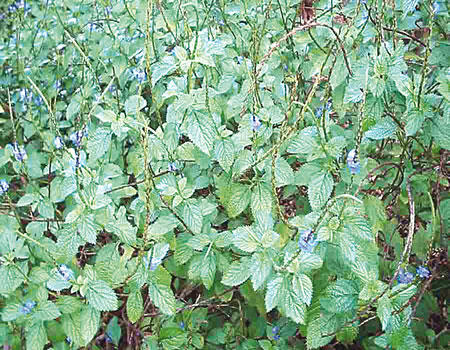One of such is Stachytarpheta cayennensis that researchers said could serve as an alternative to sedatives like diazepam. Under laboratory conditions, its leave extracts caused a reduction in time taken to fall asleep and extension of sleep duration that was comparable with drugs such as diazepam in mice.
The researchers had sought scientific evidence for the use of its leaves for the management of insomnia and anxiety as well as understand its working in the body.
In the study, both the water and alcohol leave extracts caused a reduction in time taken to fall asleep as well as improve the length of time of sleeping.
Also, the 2013 study in the African Journal of Traditional and Complement Alternative Medicine added that its water extract caused a reduction in the level of anxiety in the male Swiss mice used for the test.
Stachytarpheta cayennensis, a flowering plant, also known as cayenne porter weed, snakeweed, false verbena, tsárkíyárkúúsùù in Hausa or àgógó ìgún in Yoruba is considered by some to be a natural alternative to benzodiazepines.
In order to experience the plant’s sedative effects, the leaves are used to make a tea. In some cultures, this tea is also used to treat ailments ranging from diabetes to ulcers, diarrhoea, worm expellant, and even malaria.
Also in Ghana, the extracts of the leaves of Stachytarpheta cayennensis are employed in their traditional medicine for the management of mental illness.
No doubt, many people have suffered from some sleeplessness from time to time in their lives. However, for millions of people, this nightmare, medically termed insomnia, is repeated night after night despite its array of ill health, including depression, anxiety, high blood pressure, obesity, and poor memory.
Unfortunately, many over-the-counter and prescription medications that help to ensure enough sleep come with side effects, particularly drowsiness, dependence, and addiction, that many people would rather do without.
Moreover, other plants for sound sleep include Crinum glaucum, Securinega virosa, Spondias mombin, pawpaw and Crassocephalum bauchiense.
In 2006, researchers in the Journal of Ethnopharmacology evaluated the effects of air-dried Spondias mombin leaves extracted with aqueous, methanol and ethanol solvents in mice and rats.
It caused a reduction in time taken to fall asleep and extension of sleep duration in these animals in a dose-dependent fashion. Aside from this, it exhibited anticonvulsant properties.
Spondias mombin, also known as hog plum, is called iyeye in Yoruba, ngulungu in Igbo, isada in Hausa. The crushed leaves or infusion are used to relieve pain, sedate, treat a cough, aid digestion and stimulate the womb during childbirth.
The bark of the tree is prepared into a decoction and used to treat diarrhoea, relieve pain, stop bleeding, and treat haemorrhoids as well as skin disorders like eczema and rashes.
In 2013, researchers at the University of Lagos discovered that water extract of the Crinum glaucum’s bulb can help ensure the body relax, thus do away with stress and anxiety. Anxiety and stress do not promote sound sleep.
According to the study in Pakistan Journal of Biological Science, its intake can delay the onset of seizures, lower anxiety, as well as ensure good sleep.
Crinum glaucum’s common English names are river lily, String-lily, swamp-lily, Crinum lily and Spider lily. In Nigeria, it is known as “Isumeri” in the Yoruba, “Ede chukwu” or “Ede mmo” in Igbo and “Albasar kwa’adi” in Hausa.
The bulbs of Crinum glaucum is used in South-western Nigeria as an effective remedy in the relief of a cough, asthma and convulsions by traditional medicine practitioners. The bulb is also used in Southern Nigeria for memory loss and other mental symptoms associated with ageing.
They are also used as worm expellants and in the treatment of sores, sexually transmitted diseases and backache.
It is cut into small pieces and soaked in water for three days; the liquid (aqueous extract) is then decanted and drank to cure these ailments.
Pawpaw has been used in the Ethiopian traditional medicine to relieve stress and other disease conditions. In 2013, researchers in Ethiopia tested the effectiveness of its pulp extract in promoting relaxation in the Journal of Ethnopharmacology. They established a support for the traditional usage of pawpaw for relieving anxiety.






